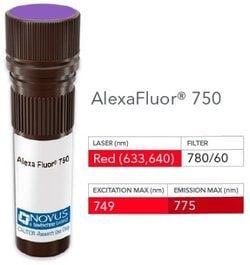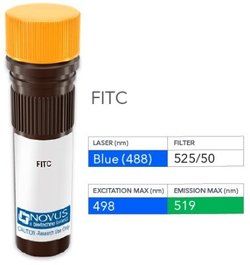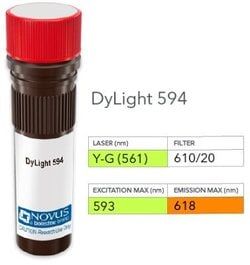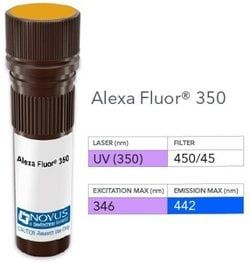CD34 Antibody (SPM123), DyLight 594, Novus Biologicals™
Manufacturer: Novus Biologicals
Select a Size
| Pack Size | SKU | Availability | Price |
|---|---|---|---|
| Each of 1 | NB006426-Each-of-1 | In Stock | ₹ 58,562.00 |
NB006426 - Each of 1
In Stock
Quantity
1
Base Price: ₹ 58,562.00
GST (18%): ₹ 10,541.16
Total Price: ₹ 69,103.16
Antigen
CD34
Classification
Monoclonal
Conjugate
DyLight 594
Formulation
50mM Sodium Borate with 0.05% Sodium Azide
Gene Symbols
CD34
Immunogen
Detergent solubilized vesicular suspension prepared from human term placenta
Quantity
0.1 mL
Research Discipline
Adaptive Immunity, Angiogenesis, B Cell Development and Differentiation Markers, Breast Cancer, Cancer, Cell Biology, Cellular Markers, Endothelial Cell Markers, Hematopoietic Stem Cell Markers, Hypoxia, Immunology, Innate Immunity, Mast Cell Markers, Mesenchymal Stem Cell Markers, Myeloid Cell Markers, Myeloid derived Suppressor Cell, Neuronal Cell Markers, Neuroscience, Stem Cell Markers, Tumor Suppressors
Test Specificity
This monoclonal antibody recognizes a single chain, transmembrane, heavily glycosylated protein of 90-120kDa, which is identified as CD34. On the basis of differential sensitivity to degradation by specific enzymes, epitopes of monoclonal antibodies to CD34 are classified into three main categories, class I, class II and class III. It is a class II antibody whose epitope is resistant to neuraminidase but sensitive to glycoprotease and chymopapain.CD34 expression is a hallmark for identifying pluripotent hematopoietic stem or progenitor cells. Its expression is gradually lost as lineage committed progenitors differentiate. CD34 is a marker of choice for staining blasts in acute myeloid leukemia. In addition, CD34 is expressed by soft tissue tumors, such as solitary fibrous tumor and gastrointestinal stromal tumor. Its expression is also found in vascular endothelium. Additionally, it appears that proliferating endothelial cells express this molecule more than the non-proliferating endothelial cells. Anti-CD34 labels 85% of angiosarcoma and Kaposis sarcoma, but with a lower specificity.
Content And Storage
Store at 4°C in the dark.
Applications
Western Blot, Flow Cytometry, Immunohistochemistry, Immunocytochemistry, Immunofluorescence, Immunohistochemistry (Paraffin)
Clone
SPM123
Dilution
Western Blot, Flow Cytometry, Immunohistochemistry, Immunocytochemistry/Immunofluorescence, Immunohistochemistry-Paraffin, Immunohistochemistry-Frozen
Gene Alias
CD34 antigenhematopoietic progenitor cell antigen CD34, CD34 molecule
Host Species
Mouse
Purification Method
Protein A or G purified
Regulatory Status
RUO
Primary or Secondary
Primary
Target Species
Human, Primate, Bovine (Negative), Canine (Negative), Rat (Negative), Sheep (Negative)
Isotype
IgG1 κ
Related Products
Description
- CD34 Monoclonal specifically detects CD34 in Human, Cynomolgus Monkey, Rhesus Macaque, Bovine (Negative), Canine (Negative), Rat (Negative), Sheep (Negative) samples
- It is validated for Flow Cytometry, Immunohistochemistry, Immunocytochemistry/Immunofluorescence, Immunohistochemistry-Paraffin.




